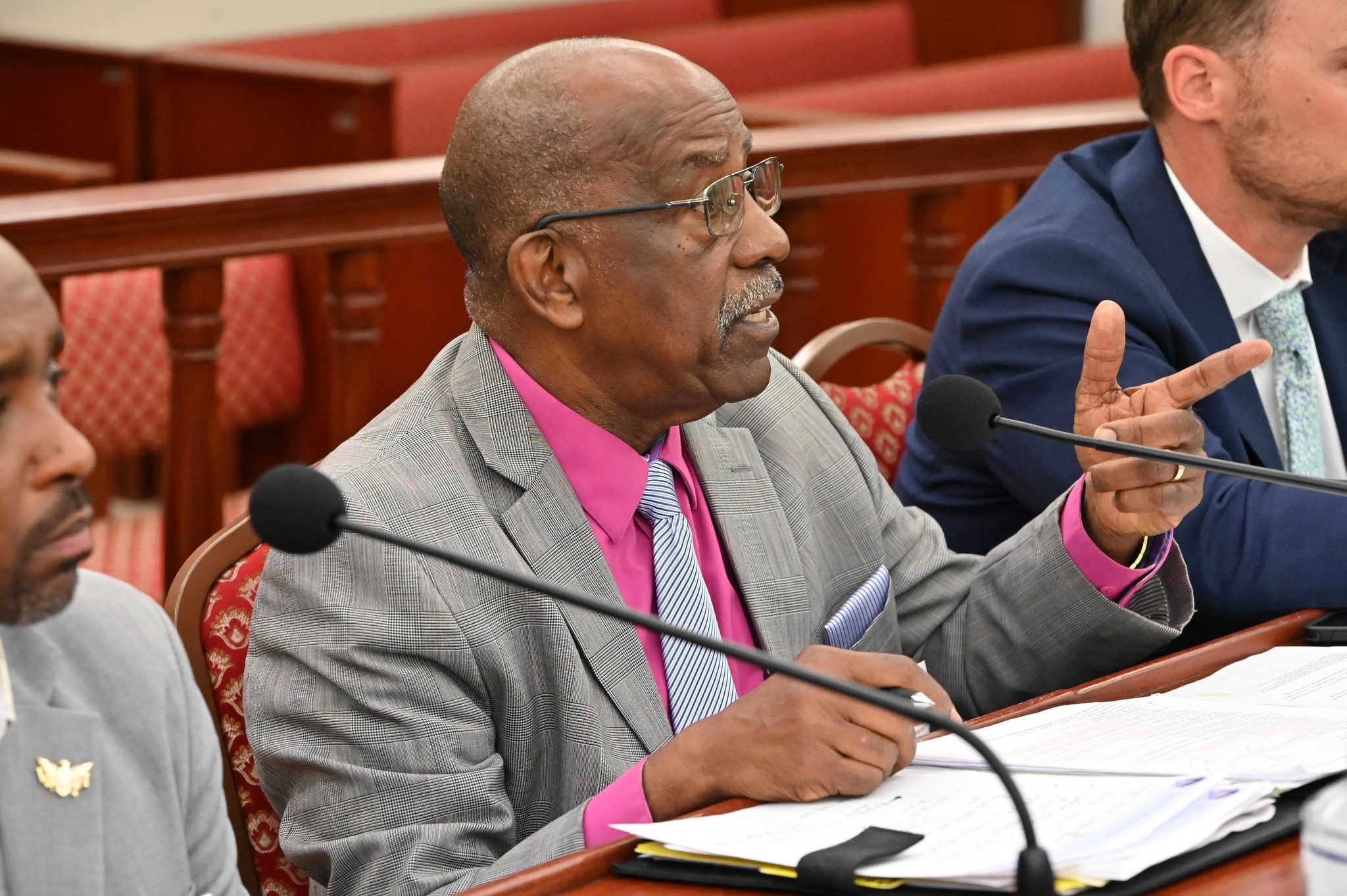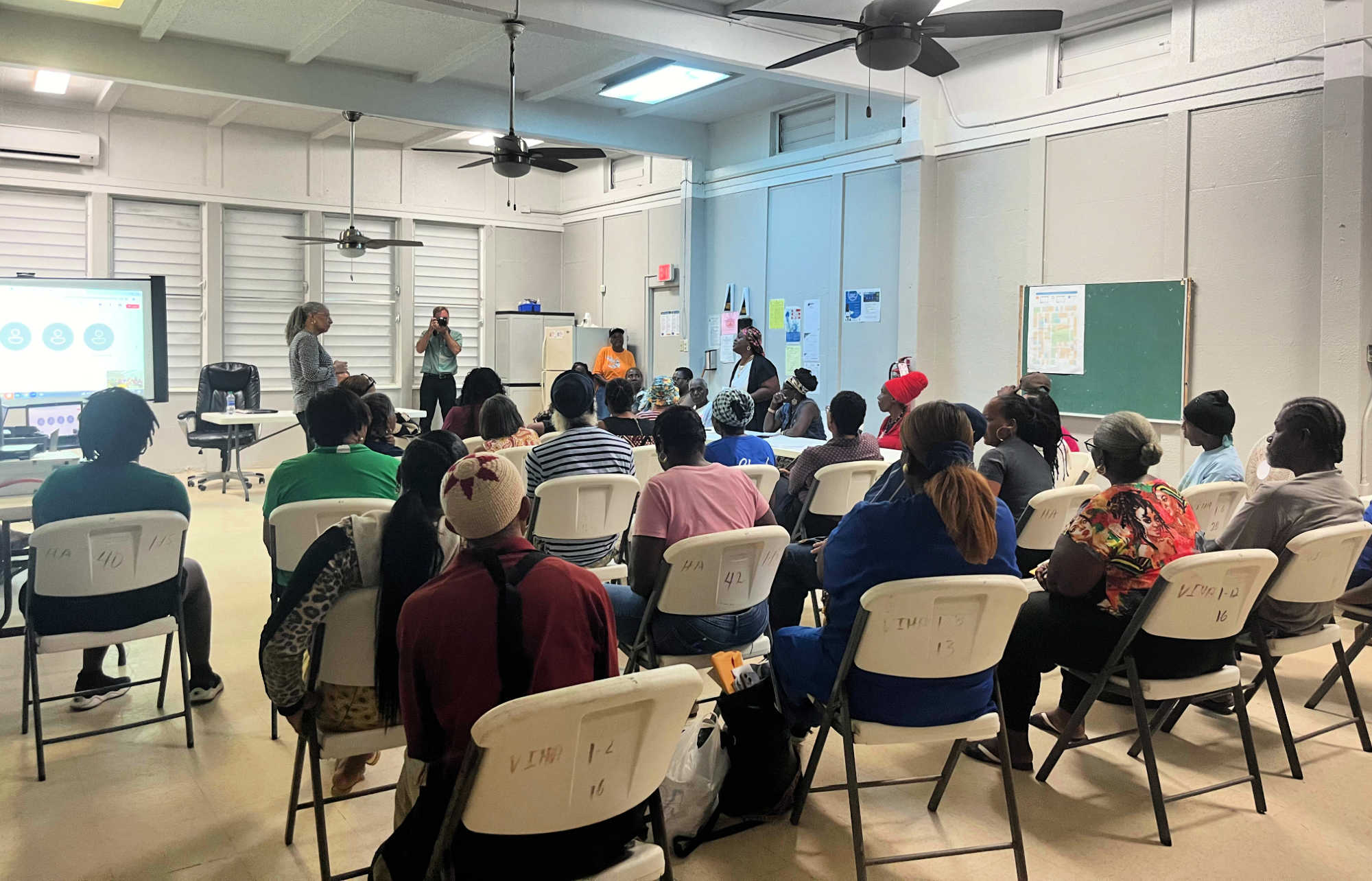Development
Revisiting the Gifft Hill Container Apartment Plan: Lawmakers Rally Behind Revised Proposal

The legislative session on Wednesday delved into three significant rezoning and variance requests within the St. Thomas-St. John district, focusing on infrastructural development.
One notable proposal, Bill 35-0137, involved Ari Goldschneider’s company, Gifft Hill Land LLC. The company sought a variance to categorize individual bedroom rentals under the “lodging/rooming house” designation on land near the Gifft Hill School in Cruz Bay, St. John. Originally, Goldschneider requested a shift from R-2, Residential Low Density to R-4, Residential Medium Density. This change would have allowed the construction of six residential buildings with a total of 74 ensuite bedrooms and shared communal spaces.
The initial proposal was met with significant resistance, as over 75 community members voiced opposition during a public meeting, citing concerns about potential overcrowding, aesthetic degradation due to the use of shipping containers, and the impact on the neighboring school. Territorial Planner Leia LaPlace-Matthew documented 47 distinct objections raised against the initial plan.
In response, a revised proposal was presented during the Committee of the Whole on April 17. Rather than a permanent rezoning, the new request sought a lease variance within the existing R-2 classification. Represented by Roosevelt David, Gifft Hill Land LLC proposed constructing two container buildings housing 24 ensuite units. This revision aimed to facilitate room rentals directly to individuals, bypassing the master lease requirement of the R-2 category.
Leia LaPlace-Matthew emphasized the urgency of addressing the housing crisis, noting national calls for zoning reform to mitigate housing shortages. Despite this, several lawmakers, including Senator Alma Francis-Heyliger, argued that the proposed $1,500 monthly rent did not qualify as affordable housing, likening it to a “high-priced boarding house.”
Nevertheless, the revised proposal garnered support for potentially alleviating housing shortages for specific demographics such as first responders, nurses, teachers, and service industry workers. Senator Samuel Carrion supported the use of shipping containers for their robustness and suitability for innovative housing solutions, especially in hurricane-prone areas.
Despite ongoing public opposition, Senator Donna Frett-Gregory expressed the need for balanced consideration in project opposition. Concerns were also raised about the lack of family-oriented housing options in St. John. Senator Angel Bolques expressed his vigilance over maintaining rental affordability, hinting at strict oversight if the developers faltered.
Other senators suggested aesthetic enhancements to the container buildings to improve their visual appeal. Senator Novelle Francis hinted that some resistance might be motivated by competitors desiring to undertake similar projects.
Senator Franklin Johnson remained cautious, reserving his support until he could review detailed architectural plans. If the variance is not approved, Goldschneider indicated a fallback option to enter a master lease with entities like Pafford, which have shown interest in renting the buildings for staff accommodations.
Parallel to this, the session also saw positive responses to two other bills. Bill 35-0241, championed by Dionne Carty Jackson, aims to transform a residential property in Kings Quarter, St. Thomas, into a family-run restaurant and fruit bar. Similarly, Bill 35-0256 proposed rezoning a parcel in Cruz Bay to public use for a new Department of Public Works maintenance building.
All three legislative measures are slated for a vote in the upcoming legislative session, highlighting a pivotal moment for development and zoning in the region.
Development
Bill to Fund Pre-Construction of Charlotte Amalie Dredging Advances

Bill No. 35-0262, which aims to allocate $1.4 million for pre-construction costs in preparation for the dredging of the Charlotte Amalie Harbor, successfully advanced on Thursday in the Committee on Budget, Appropriations and Finance. This progress follows an earlier delay caused by miscommunication that led to its removal from the agenda of its initially scheduled hearing.
The governor’s financial team, who did not attend the original meeting, later informed committee chair Senator Donna Frett-Gregory that they mistakenly believed the bill would not be presented. This confusion arose because another agenda item requiring their presence had also been removed. Although officials from the Port Authority were present, Senator Frett-Gregory stated she was “not inclined to proceed…absent of the representatives of the government that have to speak to whether the $1,434,950 is in fact available to be expended from the Community Facilities Trust Fund.”
At the time, the delay frustrated Carlton Dowe, executive director of the V.I. Port Authority. However, the VIPA team can now be relieved as the measure moved forward to the Committee on Rules and Judiciary following assurances from V.I. Public Finance Authority Director Nathan Simmonds.
“We support the appropriation of the $1.4 million for the soft costs,” Mr. Simmonds confirmed. Although only $1.1 million is currently available for appropriation in the fund, the PFA director explained that the fund’s cash balance exceeds $15 million. “We believe that there are substantial appropriations that will not be expended in the remainder of this fiscal year.” Additionally, the PFA expects an additional $3.4 million from the rum tax cover to be contributed to the fund. “Clearly, we can fund this appropriation,” he assured.
The $1.4 million allocation is intended to cover permits and other preliminary actions necessary for the commencement of the dredging work in the Charlotte Amalie Harbor. Authorities have emphasized that dredging the harbor is crucial to maintaining its capacity and accommodating larger classes of cruise ships. The project is seen as vital for ensuring a competitive edge over other regional tourism destinations.
Development
New Grant Sparks Hope for Homeownership in Williams Delight After Decades of Waiting

Senator Marise James announced a new homeownership grant program during a community meeting at the Williams Delight Center on Thursday, May 30, 2024, offering residents a $15,000 grant towards purchasing a home in the community.
This initiative stems from a town hall meeting last year where residents voiced their long-standing challenges in achieving homeownership. After attending another meeting organized by Williams Delight Residents Council President Mariesha Maynard, Senator James proposed the grant program to Governor Albert Bryan Jr. Funded primarily by the American Rescue Plan Act, the program was developed in collaboration with the St. Croix Foundation and the V.I. Housing Authority (VIHA).
While the grant provides substantial financial aid, applicants must still meet VIHA requirements, including completing a home buyers’ education course. To enhance accessibility, an in-person option of the virtual course is being developed.
Senator James emphasized the importance of homeownership for community transformation, stating, “It’s important that all of us get a piece of that dirt, that rock, a little piece of that island. It’s a beautiful island but we all need to have a little piece of it.” The grant aims to help residents build generational wealth and close the economic gap in the territory. With a two-bedroom unit costing only $22,000, the grant reduces the required personal funds to just $7,000 for prospective homeowners.
Reactions among residents varied. While some welcomed the grant, others were skeptical. A local homeowner expressed concerns about the community being used for political gain and suggested a payment plan for existing homeowners struggling with mortgage payments. In response, Senator James acknowledged the challenge of high mortgage payments as “the reality of capitalism” and referred the payment plan suggestion to VIHA for consideration.
Ms. Maynard highlighted issues with sub-standard repairs on some homes, noting that financially constrained residents often had to hire the cheapest contractors. Senator James assured that the grant process would include selecting reliable contractors and ensuring quality inspections to guarantee residents receive full value for the $15,000 grant.
Ms. Maynard closed the meeting by encouraging financial awareness among residents while celebrating the new grant as a significant milestone in their long journey to homeownership. “Williams Delight is my second home—I’ve been running around here from how long with my aunt—but at the end of the day I didn’t do it for me, I do this for ayo,” she said.
Development
Demolition of Charles Harwood Memorial Complex Main Campus Begins

The V.I. Department of Health has initiated the demolition of the Charles Harwood Memorial Complex’s main campus to pave the way for a new, state-of-the-art public health facility on St. Croix.
“We appreciate the community’s trust as we undertake the construction of this crucial infrastructure for the Virgin Islands,” stated Reuben Molloy, assistant commissioner at the Department of Health, from the demolition site. “Our goal is to reduce health risks, enhance access to quality health care services, and enforce health standards.”
Lemartec USVI, the company contracted for the demolition, began dismantling the eastern-most section of the complex on Thursday.
“It’s an exciting day here at the Charles Harwood Memorial Complex,” said Casey McIntyre, senior project manager for Lemartec USVI. “We’ve completed the initial project phases and are now proceeding with the main building’s demolition, starting with the eastern wing. We’ve cleared the building of all contents in preparation for the demolition.”
The demolition will not involve blasting, and several mitigation measures have been put in place, including privacy and dust screens, a water dust suppression machine, and wind direction monitoring. Lemartec USVI has also developed a Storm Water Pollution Prevention Plan, utilizing best management practices such as silt fencing, storm drain sediment covers, and track-out prevention, and will monitor weather conditions closely.
“We are diligently ensuring a safe site as we proceed with the demolition,” McIntyre added.
The Department of Health has taken steps to minimize disruptions to school activities, business operations, and traffic in the area. In August, Lemartec USVI completed the demolition of the Annex Building, formerly the island’s hospital. In May, the Old Club House and two other buildings at the northeast corner of the campus were also demolished.
The demolition of the complex’s main campus, the final phase, is expected to be completed by October 2024.
Health Commissioner Justa Encarnacion emphasized the department’s commitment to rebuilding the territory’s public health infrastructure. “This progress is due to a dedicated project management team working closely with key agencies and our vendors to keep our disaster recovery projects on track,” Encarnacion said. “We are grateful to the St. Croix community, especially the neighboring Richmond residents, the Juanita Gardine School family, and nearby businesses for their patience and understanding throughout this process.”
“This is part of Governor Albert Bryan Jr’s ‘Rebuild USVI’ plan to expedite the disaster recovery effort,” she added.
Representatives from the VI Office of Disaster Recovery, VI Department of Public Works, VITEMA, Witt O’Brien, The Strategy Group, and FLAD Architect joined the Department of Health on Thursday.
The Charles Harwood Memorial Complex, severely damaged in the 2017 hurricanes, was one of the first projects deemed replaceable by FEMA. The agency awarded the territory $291 million for the complex’s reconstruction, which will adhere to current national construction codes and standards. The Department of Health spent several months securing local approvals, including a historic preservation review.
Upon reconstruction, the facility will be renamed in honor of St. Croix physician and former VI Delegate to Congress, Dr. Donna Christian Christensen.
-

 Education1 year ago
Education1 year agoEducation Board Seeks Input on Schools Through Comprehensive Survey
-

 Education2 years ago
Education2 years agoCTE Board Enthusiastic About New Curriculum Standards, Yet Anxious Over Apprenticeship Support
-

 Crime2 years ago
Crime2 years agoRegistered Sex Offender Detained for Illegal Firearm Possession During Annual Surveillance Drive
-

 Development1 year ago
Development1 year agoCosts Surge as Donoe Estates Housing Project Resumes with New Contractor
-

 Videos3 years ago
Videos3 years ago2022 Gubernatorial Election: Voters Speak Out
-

 Videos3 years ago
Videos3 years agoGubernatorial Teams Celebrate St. Croix’s Bull & Bread Day
-

 Videos3 years ago
Videos3 years agoWakanda’s Female Might: A Dive into ‘Black Panther: Wakanda Forever’
-

 Crime2 years ago
Crime2 years agoSt. John’s Westin Resort Scene of Armed Robbery, Prompting Heightened Police Vigilance




